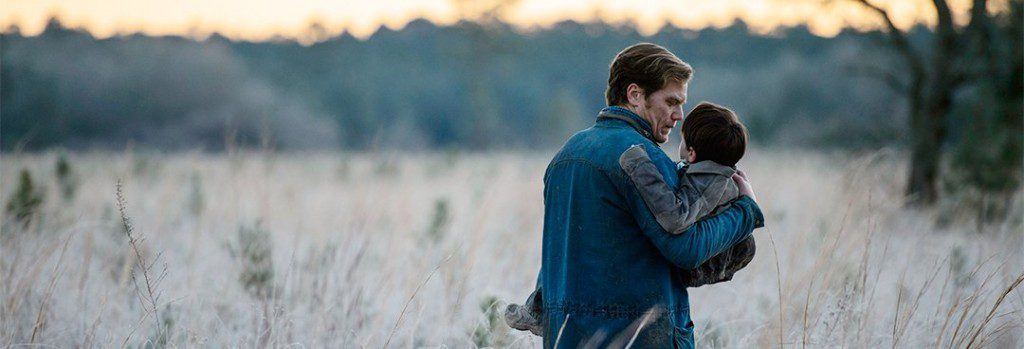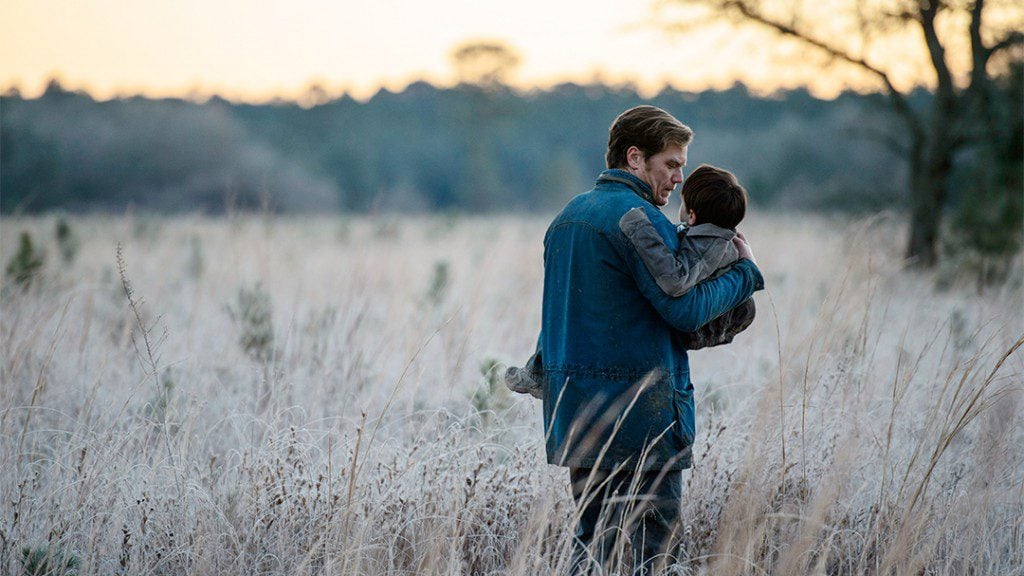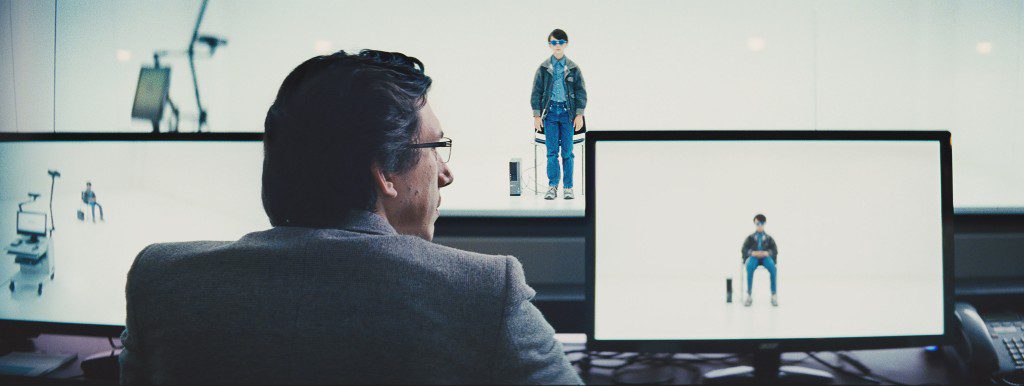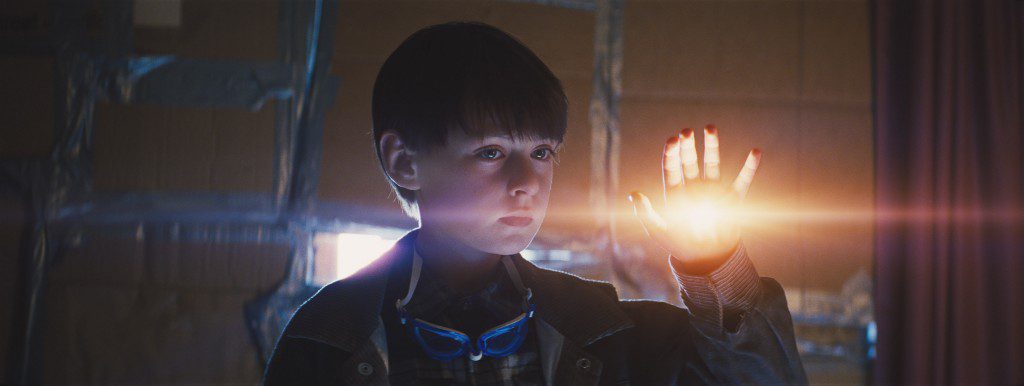From family feuds (Shotgun Stories) to unrequited love (Mud), the films of Jeff Nichols have often focused on deeply personal relationships and intense emotions. But they also sometimes dabble in genres with larger implications, from the is-it-or-isn’t-it apocalypticism of Take Shelter to, now, the explicit science-fiction/fantasy of his latest film, Midnight Special. Through it all, Nichols has kept his focus on the close and often familial connections between his main characters.
Midnight Special, which goes into semi-wide release today, revolves around a boy named Alton Meyer (Jaeden Lieberher) who was born into a cult and has, shall we say, unusual powers. (He wears goggles for a reason.) As the film begins, the boy is kidnapped by his father Roy (Nichols regular Michael Shannon) and Roy’s friend Lucas (Joel Edgerton), and his powers also catch the attention of the government, including an agent named Paul Sevier (Adam Driver) who may have more than a professional interest in the boy and his abilities. A multi-pronged chase ensues, as the feds think the boy is a threat and the cult thinks he is a saviour — but to Roy and his estranged wife Sarah (Kirsten Dunst), he is first and foremost their son.
I had a chance to speak to Nichols earlier this week about the film’s themes and influences. What follows is a slightly edited transcript of our conversation. Note: while we didn’t discuss any specific plot spoilers, we did discuss the film’s narrative trajectory, parts of which take a while to unfold within the film itself.
–
When I first saw the film, I initially thought that your work has been going in an increasingly fantastical direction, but then when I took a look at your filmography, I realized that Mud actually came out after Take Shelter, and now you’ve got Loving [a true story about the 1967 court case that abolished the laws banning interracial marriage] coming up after this. So are you sort of alternating between genres now?
Jeff Nichols: You know, it’s funny, I don’t think that’s the way I lay out my career trajectory. I just do these things that relate to my life at the time that I’m writing them, and it’s not so much that I’m going to do one for the genre fans and now I’m going to do one for this other part of my personality. That being said, I do have a lot of interests, you know. I’ve got a lot of things on my mind, and a lot of films that I love and stories that I love, and I really don’t consider myself making one type of film, other than to say that I’m making films that are important to me. And so that’s really the only barometer that I apply to these things — and oddly enough, I hold Midnight Special kind of in the same camp as I hold Mud, even though the two, genre-wise or category-wise, are totally different.
In the same camp how? What binds those two films together?
Nichols: Well, both reflect part of my, kind of, emotional being. Mud was very much a film about unrequited love. It was a film about how I felt in high school when a girl broke my heart for the first time. Midnight Special is very much about the way I feel as a new father. Both of these are emotions that are palpable, they are things that I feel very deeply, and kind of regardless of where I’m at in the filmmaking process, I can check in with those emotions and I feel ’em. They strike me. And so when I’m thinking about my films, I’m thinking about that emotion. I’m thinking about that connection that I have, personally, to them, and to the stories. I’m not really thinking about, “Oh wow, this is going to be in the sci-fi section of the video store that no longer exists!” I’m thinking about how they relate to me personally.
I read a couple comments of yours where you talked about how the film was inspired by the sense that, as a new father, you realized there was something about the child you can’t control, and it was funny, because reading that comment, I was reminded of how my own first two children were born about four months before the remake of The Omen came out, and I found that, while watching that film, I was suddenly struck by how it resonated for me on that level, because I was already beginning to see individuality and individual personalities in my kids, and realizing that they have this developing interior life —
Nichols: Right.
— and of course The Omen is a horror movie that plays into that, but your comments reminded me of that. Is Midnight Special maybe a horror movie?
Nichols: (laughs) Is it a horror movie? No. But is it a movie about fear? A lot of my movies are about fear. Take Shelter is about fear. Shotgun Stories is about fear. But what separates the films is the nature of that fear and what we do with it. And I think that’s kind of what parenthood is. The great thing about kids is they show you how little control you have over things, and I actually think it’s a positive in the long run. I think it’s in our nature to want to control things, it’s in our nature to want to control their environment to make them safe, to control their development so that they grow into the type of people that we want them to be. And at the end of the day, though we certainly can affect those things in the margins, we have no real control over who they become or whether or not a tornado drops out of the sky and wipes us out, you know? And so I think there is a beauty in that, I think there’s a level of love that comes out of that, just because it punctuates how precious the time that we have with them is.
Michael Shannon and Kirsten Dunst really are playing Alton’s actual parents, his biological parents, right?
Nichols: Sure.
You know how, in the Harry Potter world, there’s this thing where muggles — people who don’t have magic — can still have children who have magical powers?
Nichols: Sure.
In developing the world of this film, did you come up with any sort of theory or whatever for how two sort of quote-unquote normal people could have a child like Alton, who belongs in that other world?
Nichols: I didn’t really have to develop much of a theory, because I think that’s how life works. How can two parents with average IQ’s give birth to a genius? How can two parents with brown hair and brown eyes give birth to a child with blond hair and blue eyes? It’s possible. I think the genetic code and I think the way things work is so complex that who knows how these things, and what’s in our historical data, combine to make these kids. I just think that’s the way life works. So to be honest, it was never much of a hiccup for me, in terms of how to explain that side of things. I think things spring up in nature that are evolutions of things, or– I just think, y’know, one day, y’know, things change, and things shift, and that’s how it works. So no, I didn’t feel it was necessary to lay out a kind of explanation behind that, because I just think that’s how things go.
People have mentioned a few different sci-fi reference points for the film, but for me, the one that really stood out was Close Encounters of the Third Kind, because Adam Driver’s character is sort of a government official but he sort of has a personal connection to what he’s pursuing that transcends that, and the fact that Adam Driver’s character has a French last name seemed to me to be a nod to Francois Truffaut’s role in the other film. Am I onto something, or is that a coincidence?
Nichols: Hundred percent. That’s exactly what it was. I was trying to combine Richard Dreyfuss’s character from Jaws with Truffaut’s character from Close Encounters, in terms of personality traits. But the important thing about both those characters — even the character in Jaws — is that they’re men of science but they believe in something greater, and that interests me.
Why does that interest you?
Nichols: Two answers: First, just as a writer, it starts to separate them from being stock characters. Hopefully they stop just being the government cliché where they carry the same point of view as the supposed government, which is so big and so bureaucratic, how would anyone have a point of view that lines up with it, other than just in the sense of get the boy, get the boy. So as a writer, it makes him, I just think, more interesting and less cliché. But beyond that, I’m fascinated by people that have a concept of the limits of their own minds. Sevier, in this instance, is a mathematician, he’s someone that understands numbers, and I think the universe is run by that order. But, he also knows that there might be calculations out there in the world and in the universe that are beyond his understanding — and that, to me, is a guy I want to hang out with, a guy who isn’t limited by his immense brainpower, but is in fact kind of liberated by it. Does that make sense?
Yeah, it does. Other sci-fi films that have been brought up, of course, include E.T. and Starman, but in those films, the title characters are aliens who are going home, basically. In your film, Alton is — depending on how you define “home” — he’s leaving home for another home. How does that change affect the story, the fact that Alton is not necessarily going back to where he came from but actually leaving or even abandoning where he came from?
Nichols: It feels like, again, a natural progression of what our children do. The hope is that they leave, as strange as that sounds, but we want them to leave in an organic progression of things. We hope they go to college, and then call us on the weekend. That is success, I guess. What we really hope for, though, is that when they do leave us — and they are going to leave us — that they are prepared, they know who they are, and they are prepared for the world at large. So your question is interesting, because it presumes that I was holding up a different trajectory and then subverting it — which sometimes happens. Like, there are lots of things in sci-fi films that I held up and I wanted to go left rather than right. This wasn’t one of them. This was me honestly just trying to encapsulate the feeling that a parent goes through in relationship to their child. Now, unfortunately some parents have to deal with that separation in a way that’s not organic, in a way that happens too soon, but that’s not the way it’s meant to be. And that certainly goes back to the issue of fear. But does that answer your question?
I think it does. I also wanted to ask about the religious elements in the film. Harking back to your earlier films, like Shotgun Stories and the depiction there of that sort of Christian subculture, your earlier films were coming from a place that seemed very personal or familiar to you, whereas Midnight Special begins in this very alien — and I don’t mean that in the sense of extra-terrestrial — sort of alien environment, with that cult, basically. How was it dealing with that material, a religious context that is perhaps different from what you’ve done in your earlier films?
Nichols: That all just came through research. It came through research of the FLDS [Fundamentalist Church of Jesus Christ of Latter-Day Saints] ranch that was here in Texas, which is where I live. It was in Eldorado, right up by San Angelo, and in fact a friend of ours wrote a series of articles about the government intervening when they began to receive reports about children being abused and married away too young and all these other things. I co-opted that setting, separating it from the FLDS section of things, and said, “What if inside of that type of community, a boy like this was born? How would they separate themselves if it’s no longer Warren Jeffs who becomes the conduit to this higher thing?” The boy is a very obvious example of how would things change. And those are just the particulars of the story. That all just came out of research.
How it relates to the other films being more personal, less personal: I’ve never dealt with schizophrenia, I’ve never dealt with mental illness in my family or with myself, thank goodness, but that became the cornerstone of Take Shelter — as well as deafness, I’ve been fortunate I haven’t had to deal with that in my own life, but it was appropriate to the story. There are things in Shotgun Stories that I’m sure to you seem like they’re very personal to me, and must have come right out of my life — I know a lot of people think that about Mud — but you know, I grew up in the suburbs of Little Rock, I was kind of a suburb kid, so I wasn’t a river rat like those boys in Mud, I discovered those houses when I was in college, so discovering houseboats in college and saying, “Wow, this is something visually really compelling, and what a great jumping-off point for a film like Mud,” it’s kind of similar when you see these photographs of these women from these FLDS ranches. What a fascinating, bizarre jumping-off point for a film. Those personal relationships are what are so important. The details are what change from project to project.
–
Here is a trailer for the film:
Here are three clips from the film:
And here are three images from the film:
Roy holds his son Alton:
Sevier interrogates Alton:
Alton exhibits one of his powers:
















